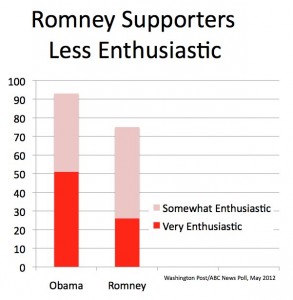
Despite cruising at freeway speeds, I had the camera ready to snap a shot of the giant billboard hanging over the I-35W/I-35E interchange up by Forest Lake. I had blown by it a couple times before without getting a shot and was determined not to screw up again.
But it was gone. Replaced. And it wasn’t even Labor Day.
What was it? What did it say? It was a Jensen-Birk campaign ad, in Golden Gopher colors, with their two smiling faces and a tag line that read, “For lower gas prices.”
That’s right, folks. Vote for those two and they’ll bring down the price of gas. Because? Well, maybe because they’re on a first name basis with the Saudis and can convince them to pump more oil to Minnesota. Or maybe it’s just another thing they (very) clumsily hope/assume their voters are dumb enough to believe.
My blogging compadre, Joe Loveland, aka El Jefe, covered the miserable-to-dire state of the Jensen-Birk campaign in his last post, so I won’t retrace his steps. Other than to add this … even by the deeply debased standards of our Peak Polarization era, these two, a (presumably) licensed physician and a Harvard graduate are engaged in one of, if not the most, inept political campaign our fine state has seen since Harold Stassen’s 13th or 14th gubernatorial runs.
Like many of you, I often ask myself, and hear the question asked by others, “Do you think they really believe any of this [bleep]?” The “they” usually being Trump-era Republicans defending the indefensible or blithering about the tinfoil hat conspiracy theory du jour. (You’re following the latest? How the real issue with Trump stealing and hiding Top Secret nuclear documents is … the FBI and DOJ leaks about it?)
To many, politics is all about winning, so it hardly matters what you believe. That is not a news flash. Politics is a sales game. You say whatever you think you need to close the deal. We all get that.
But as with so many other examples, the equivalency factor — where “they all do it” — things are gravely, absurdly, farcically distorted in our current era. True, every year Democrats will warn voters that Republicans are coming to take away their Medicare and Social Security. But when you’ve got characters like U.S. Senators Ron Johnson and Rick Scott saying essentially that, the worst you can give Democrats is One Pinocchio. Because it’s, y’know … kinda … not-so-remotely … possible.
But Jensen and Birk. OMG.
I’ve met Birk — the Harvard grad and ex-football player. Casual event. Cordial conversation. He presents well. He’s upright, groomed, doesn’t drool and speaks in complete sentences. But, good lord, what is he possibly thinking when he spins out medieval, fundamentalist Mormon idiocy like how liberal culture promoting abortion rights encourages women “to have careers?”
You could have flunked out of North Pokegama Community Tech and known that “the gals” — 51.7% of the state’s workforce — would hear a line like that and think, “What a [bleeping] idiot.”
Then just recently Birk, who may have impulse control issues, took the bait in a Twitter war with the well-known, and very publicly reformed-Republican insider, Michael Brodkorb. Responding to Brodkorb’s entirely fair observation that current polling looks bad for Jensen-Birk, the Harvard grad blasted back, “Michael – never heard of you so I looked you up. Google says your expertise is in adulterous affairs and driving while drunk – nothing about politics. Might want to sit this one out bud.”
Again … OMG.
And have I mentioned Jensen comparing to the Walz administered COVID lockdown to … the Holocaust?
Much like bringing down the price of gas — (the cheaper for Birk to commute back to his gated, $4 million Naples, Florida home) — Jensen and Birk, chastened by the national blowback to the repeal of Roe v Wade, are now all over crime, and how “Walz failed.”
Crime of course is a campaign standard, like cutting taxes (and Jensen has … wait for it … vowed to eliminate Minnesota income taxes). But what sort of potential voter actually believes they could do anything to stop (gang banging) gun violence? I mean without serious gun reform?
More to my point here, what level of cognition are educated guys like Jensen and Birk projecting on their ideal persuadable voter?
Answer: Only angry fools would actually buy what they’re selling. Which is why they’re exuding a palpable scent of contempt for the voters they’re appealing to.
The Jensen-Birk miasma is of course a new standard in Republican campaigns. And it flows downhill from the master.
As a recent Politico piece, titled, “How Trump Taught Everybody to Be Obnoxious and Cruel” said, “… [it] might be that Trump is not the cause of the new crudeness and rudeness of contemporary politics — just an especially florid manifestation of much deeper trends. The paradox of modern technology, especially as harnessed by social media, is that it is especially proficient in unleashing primitive dimensions of human character. That suggests a renaissance of insult, indignation and conspiracy theory — the signatures of the politics of contempt — is going to be with us for a long time to come no matter what happens to Trump.”
A lot of campaigns are not ready for prime time. But Jensen-Birk are sliding into a rarefied zone, especially since they can’t explain away their astonishing blundering and crudeness to a lack of quality formal education.
Which leaves me only to mention … Judy Dutcher. The DFL’s 2006 lieutenant governor candidate is credited for sinking Mike Hatch’s race against Tim Pawlenty with one … one … screw up. Not a half dozen every day.



